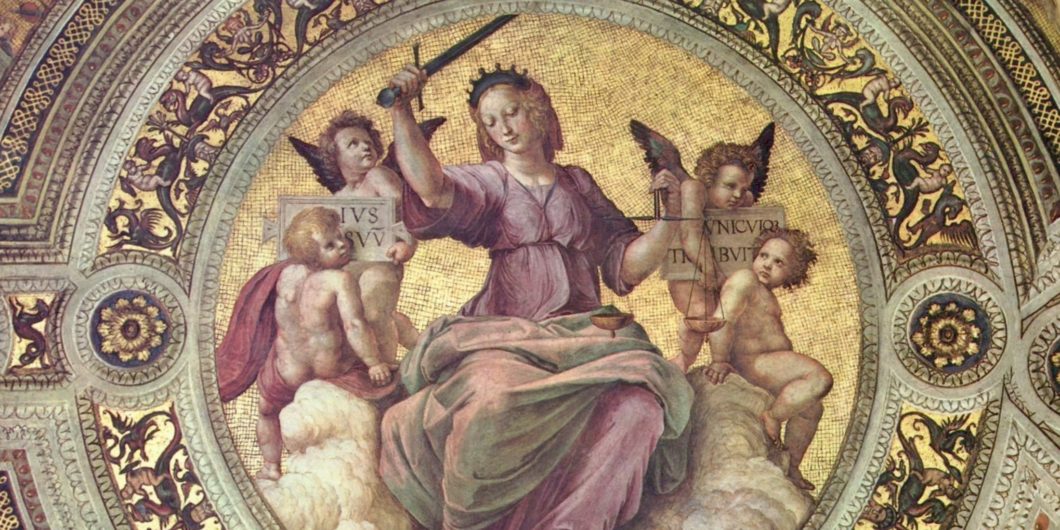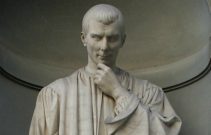The Complicated Politics of Virtue
James Hankins’ Virtue Politics is an accomplished study of the Renaissance humanists’ political thought. He begins with Petrarch, concludes with Machiavelli, and considers the work of Leonardo Bruni, Biondo Flavio, Leon Battista Alberti, Francesco Patrizi, and others. He also includes several thematic chapters.
For students of the history of political thought, Hankins’ most important claim is that Quentin Skinner and others are wrong when they argue that a clear republican tradition, or a preference for republican government, existed among humanist thinkers before Machiavelli. They did not exclusively prefer republics to monarchies. Indeed, their focus was not on regime type or on legality, and they disliked the legalism of their time. When Renaissance thinkers decried tyranny, for example, their concern was not about lawless, one-man rule as such, but immoral or vicious actions and harm to the common good. These could arise (or be corrected) in any regime. They believed that the heart of good government was virtue among the rulers, and that the road to such virtue was serious literary, historical, and philosophical study. Character, not form of government, was central.
Uncovering the importance of such “virtue politics” is the heart of Hankins’ book. His intention is not limited to correcting Skinner’s overemphasis on civic republicanism or the historian Hans Baron’s understanding of civic humanism. Rather, Hankins’ goal is also, or primarily, to develop the theme of virtue politics in a way that is useful and striking for scholars and citizens generally.
The humanists’ focus on virtue is connected to the rediscovery and translation of several works of Plato, Aristotle, and Xenophon, and to their renewed attention to Roman authors and politicians. The Italian Renaissance was indeed a renaissance and Rome was indeed the model. What precisely this meant varied among the many authors Hankins studies: Was Caesar a tyrant or a model of virtuous excellence? What was the precise form of pre-imperial Rome’s political structures? Whatever their differences on such questions, all believed that virtue among rulers was central, that such virtue was not limited to the wealthy, and that humanistic education was the key to attaining it. They accordingly disliked partisanship, although several, perforce, supported partisans. Some important tensions remain, however, both in the humanists’ ideas and—to the extent that he follows them—in Hankins’ book itself.
What is Virtue?
It is difficult, or at least unseemly, to gainsay the importance of virtue. What is virtue, though? Hankins does not report systematic discussions among the authors he analyzes. He of course mentions several virtues, and if one gathers his remarks one finds a more or less complete Aristotelian or Roman list. But are they all equally important? Or can they be ranked, as Aristotle suggests? Is greatness of soul the central virtue? If so, is such pride, or magnificence, compatible with Christian humility? Is moderation or, rather, asceticism a virtue? Hankins presents Petrarch and others as turning to classic virtues while largely remaining believing Christians. But the classic and Christian virtues are not altogether compatible. Saying that one group of virtues deals with the here and now and the other with the afterlife, as he suggests that some of his authors claimed, cannot resolve the issue, given the interrelations and multiple effects of our intentions, choices, and actions. Indeed, the result of such a view might well be widespread casuistic hypocrisy.
Related to this issue is a vagueness about why virtue is central to human happiness. Aristotle and Plato connect their understanding of virtue to their views of the soul and pleasure. Such discussions are missing in Hankins’ account. Missing too is any detailed exploration of prudence, to which Hankins often refers but whose content is not developed. This gives the praise of virtue and prudence (by Hankins and/or his authors) a somewhat hortatory character. Perhaps ignoring or downplaying the connection of virtue to pleasure or to the powers of the soul is related to the largely unremarked tension between Christianity and classic virtue.
The humanists believed that we can attain virtue through literary studies—poetry, philosophy, history, rhetoric, and so on. But why? One uncovers models to emulate, hears or reads about the praiseworthy, and improves certain skills. Yet one also discovers unsavory characters and passions to which we might also be attracted. Which works have which effects? Perhaps more significantly, neither Hankins nor his authors bring out the tension between intellectual excellence and moral excellence as Plato and Aristotle did. Both of them make clear that unstinting philosophical pursuits call everything into question, which means that they call into question religious as well as political authority. More directly, Plato indicates how philosophy may lure the gifted young away from the activities the city most requires of them.
A brilliant regime that lasts for a day is inferior to a largely just or even adequate regime that lasts long enough to do some good.
These disharmonies, and how the philosopher should deal with them, are not part of Hankins’ or his authors’ themes, at least as he presents them. They apparently linked philosophical with ethical virtue in a way that sometimes reduced philosophy to comprehensive yet superficial intellectualism. This is not to deny that learning from and emulating some of the Romans and Greeks is a long step forward from the tyrannies and brutalities faced by our authors. Convincing leading figures to pursue humanistic learning will often improve them, and with sensible guidance, it can enhance their characters. However, the complexity of virtue, the difficulties of attaining it, and the subtle relations or discrepancies between theoretical and moral excellence are not thematic in the book.
Some of this looseness about the content of virtue and the education that might enhance it is also visible in Hankins’ discussion of Confucius, near the book’s conclusion. He treats Confucius’ thoughts about virtue, and the importance for Chinese mandarins of studying Confucian texts, as similar to the humanists’ advocacy of virtue and learning. But the content of the Analects is very different from, say, the content of Aristotle’s Ethics: the Analects connects proper behavior to different groups and to ritual, and analyzes neither prudence nor the connection of virtue to the soul. Above all, it does not connect happiness to unbridled philosophical examination. The general sense that one can create or advance a meritocracy marked by qualities broadly similar to some classic virtues and attained by studying several literary texts papers over large differences among the classics, the Renaissance humanists, and the Confucian mandarins.
Democracy—Low but Solid?
Although Hankins’ (and the humanists’) goal is to show the importance of virtue in politics, he also says much about their view of various regimes, especially those that include a popular or middle-class element. Here, I would say that he or they somewhat overstate the importance of virtue in Aristotle’s practical understanding and downplay the significance of democracy. Democracy and oligarchy are the usual or inevitable regimes, so Aristotle discusses their varieties at length. He prefers the less extreme or unjust sorts. Justice, however, does not mean only the rule of virtue but properly accounting for—and justly distributing offices in terms of—the political claims of the wealthy and the free. The city needs wealth and free soldiers, not only outstanding virtue. It is good to convert the political claims of the many and the few to claims based, to a degree, on virtue. This can show how middle-class desires can resemble actual virtue, and may make room for true virtue should it appear. But individual virtue as such is not the only justified claim to rule or share in rule, and it would be a most unusual city that was ruled by the virtuous simply.
Even Plato—in his Statesman—finds democracy to be a good regime, although the worst of the good ones. Indeed, democracies and oligarchies are recommended by our desire to see decent governments last. If the most powerful parts of a community do not support its government or way of life, it will fail. A brilliant regime that lasts for a day will not be able to institute justice or virtue: it is inferior to a largely just or even adequate regime that lasts long enough to do some good.
This last point leads us to Hankins’ thoughtful discussion of Machiavelli. As a statesman and writer, Machiavelli is within, or completes, the Renaissance’s humanist tradition, although his training is more practical and less learned. He too is non-partisan in his way, willing to serve many masters. But the substance of his thought differs markedly from that of his predecessors. Machiavelli substitutes virtù—“aggressive spirit” or “manly strength and competence”—for classic virtue, decries the weakness Christianity has engendered, mocks the supposed practical utility of philosophy, supports the importance of citizen armies, and focuses on the significance of necessity. Hankins brings out these radical steps in Machiavelli, but he is also careful to point out the failure of Machiavelli’s military recommendations, the error of his view of Christianity’s (military) weakness, and the limits of his distance from morality.
Despite recognizing these elements of Machiavelli’s radicalism, Hankins does not treat Machiavelli as engaged in a wholesale overturning of both the classic and Christian standpoints. He also does not develop thematically the link between Machiavelli’s arguments and the later liberal democracies that are arguably grounded in this overturning. This would take him beyond his task. But one may argue that these regimes faced and largely met some of the political problems that bedeviled the early humanists. What we find in Locke’s writings or in American practice, for example, are “low but solid” regimes: They attain reasonable longevity, control tyranny, and recognize the likelihood or inevitability of partisanship. They try to limit government to helping citizens to secure their rights and meet economic necessities, and they ground legitimacy on proper election and procedure, neither requiring nor preventing political excellence.
Moreover, liberalism promotes, among both citizens and representatives, virtues such as responsibility, toleration, and some measure of courage, moderation, and generosity. But it does not demand outstanding ethical virtue. It controls tyranny by dividing political power and by promoting and permitting private entrepreneurial activities for the spirited, thereby directing them away from politics simply. And it recognizes equality not only in the possibility of reaching virtuous heights, but also in an equal right to responsibly satisfy one’s desires. Liberal democracy’s difficulties are always with us: no political order can be perfectly just. But our attempt at a lasting, reasonably just regime seems more prudent or less fantastic than what claims to be a non-partisan regime of rulers with truly virtuous characters.
Virtue and Self-Interest
It does not take Machiavelli to think that when Hankins’ humanists promote virtue and humanist learning as solutions for tyranny they are being naïve. But such an accomplished group of men who held leading political positions in dangerous and trying circumstances is hardly naïve. It is more accurate to say that their rediscovery of classic virtue and politics, together with their attachment to Christianity, excessive emphasis on virtue (as opposed to other elements in Aristotle’s political science), and their own political circumstances allowed a renaissance but not the intellectual and political reform whose elements Machiavelli rediscovered and re-ordered.
One might with greater justice wonder about the possible self-interest of Renaissance humanists. In other cases, one would be suspicious of those who claim that ruling demands characteristics that they alone can supply. Hankins does discuss Boccaccio’s criticism of Petrarch for serving the sort of masters he claimed he would not. But this differs from skepticism about the self-interest involved in promoting the necessity of the literary and historical learning that one furnishes. Perhaps a forthright recognition of the tie between virtue and self-interest, which somewhat lowers the one and raises the other, leads to a more secure and effective, if imperfect, justice than does the promotion of virtue simply.
My arguments may, of course, be incorrect, or fail to represent Hankins’ discussions fully. In any event, despite some unresolved questions, we are unlikely to see soon another book that combines such extensive and precise learning with such a mature and subtle grasp of important matters. We are fortunate to have it.



